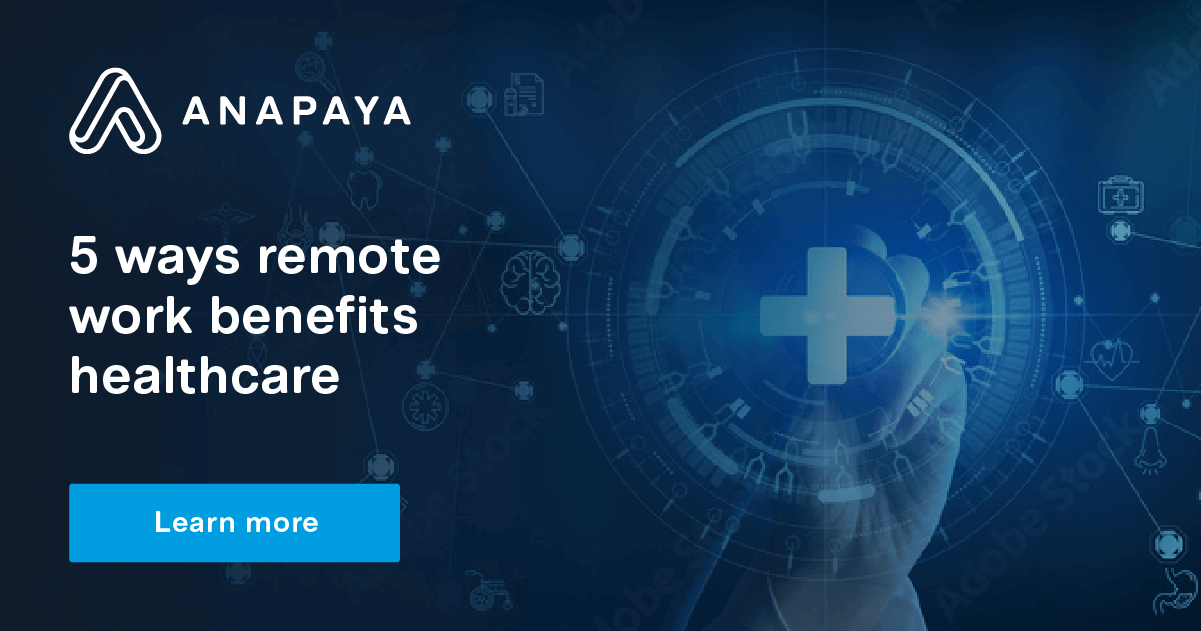Remote working is here to stay - at least according to Forbes, which reports that 25% of all professional jobs in North America will be remote by the end of 2022, and remote opportunities will continue to increase through 2023.
The effects of remote working can be felt across all industries - but in what ways has it affected our lives? Some of the most pertinent sectors that have a day-to-day impact on how we live are those that operate within critical infrastructure. Utilities, government services, energy, and transportation all have roles to play for our convenience, the economy, and our lives.
Perhaps one of the most notable is the Healthcare industry. Providing access to life-saving services and information, you could argue that it has the greatest influence over how we choose to live. However, the shift to remote working is changing the industry - but is it for the better?
In this blog, we’ll explore how remote working and technology are changing healthcare and how those changes can benefit us today.
1. Improved access to care
Remote working has made healthcare more accessible to patients, particularly those who live in rural or underserved areas. Telehealth and telemedicine have enabled healthcare providers to offer medical consultations and monitor patients remotely, thereby reducing the need for in-person appointments and hospital visits.
Patients can now receive medical care from the comfort of their homes, which has led to more convenience and faster care. In the case of reliable and speedy connectivity, it also has the added opportunity for easier follow-up consultations and more cost-effective access to professionals. This means that remote working ultimately makes a population healthier and more cared for without a substantial investment in development or infrastructure.
2. Increased efficiency and effectiveness
Remote working has enabled healthcare providers to work more efficiently with digital tools and platforms, allowing real-time data sharing and collaboration. This has resulted in more coordinated and efficient care, as healthcare professionals can easily access patient data and communicate with each other to develop treatment plans. Geographical challenges no longer limit healthcare professionals - they can consult and work together faster than ever before with remote working solutions.
While working with and sharing patient data over great distances poses a risk of data theft or cybercrime, its benefits are immense for healthcare providers who can guarantee the safety and security of their patient data.
3. Reduced costs
Remote working has also led to reduced costs for healthcare providers. By adopting digital tools and platforms, healthcare professionals can reduce administrative costs and improve workflow efficiency.
Remote working has also encouraged a move towards digital transformation, with numerous benefits such as the elimination of paper records, the institution of databases, and more efficient, automated processes.
Remote monitoring tools have also helped reduce the need for in-person appointments, with patients being notified when they should see a healthcare professional. This results in cost savings for patients and providers, who now have greater access to data and clearer decision-making.
4. Improved patient-to-doctor engagement
Remote working has enabled healthcare providers to engage with patients more frequently, leading to improved patient engagement. Face-to-face video calling, health monitoring IoT devices, notifications, and more have allowed patients to fully engage in the healthcare process completely remotely from hospitals or clinics without an appointment.
By using telehealth and other digital tools, healthcare professionals can easily check in on patients and provide ongoing support. This eliminates the need for commuting and increases the likelihood of patients and doctors finding time for proper and effective healthcare.
5. Improved staff retention
Remote working has been shown to improve staff retention rates in healthcare. By offering remote work options, healthcare providers can attract and retain top talent who value work flexibility.
Remote working has given healthcare professionals more options regarding their work schedules. With the ability to work from home, healthcare providers can better balance their personal and professional commitments, leading to improved work-life balance and performance.
This makes it more likely for staff to find satisfaction in their roles, be more productive and stay longer within an organization without contributing to churn. Healthcare providers gain a loyal employee base that grows with experience instead of burning out.
The catch - it all hinges on one thing
There’s no doubt that remote work is advantageous to any healthcare provider. However, one major downfall may keep many from making the leap. Connectivity and the dangers of cybercrime are the primary challenges when it comes to remote working.
At any moment, data leaks, hijacking, or simple connectivity failures threaten to grind healthcare provision to a halt if it largely relies upon remote work solutions. In the case of an industry where life and death are a real prospect, anything less of a guarantee of the security of patient data and strong connectivity is irresponsible at best and criminal at worst.
Thankfully, a new solution now exists with SCION.
SCION for healthcare
Developed at ETH Zurich, SCION (Scalability, Control, and Isolation On Next-Generation Networks) is the most secure and reliable open inter-domain routing protocol available. It functions as a separate network with the flexibility of the public internet and the security and transparency of a private network.
Healthcare providers and professionals can render their data transmissions invisible from prying eyes - no matter where they work. Add lightning-fast failover capabilities, path control, and failure isolation, and you have a highly secure and failure-proof connectivity solution on the market.
SCION has already been implemented for healthcare providers across Switzerland with HIN's Vertrauensraum or HVR - a SCION-based network that significantly improves healthcare connectivity data protection.
If you would like to find out more about SCION for healthcare, read the HVR post here.
TAGS:
Healthcare, Remote work




.png?width=380&name=Image%20(11).png)




